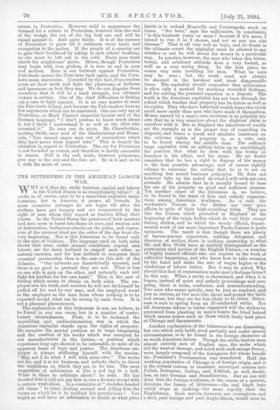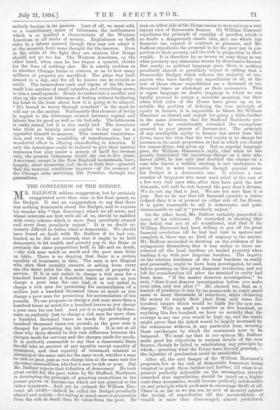THE BITTERNESS IN THE AMERICAN LABOUR WAR.
WHY is it that the strife between capital and labour in the United States is so exceptionally bitter ? A. strike is, of course, sure to be a somewhat explosive mani- festation, but in America it passes all bounds. In most countries outrages do not begin till after the strikers have got hungry and are exasperated by the sight of men whom they regard as traitors filling their places. In the United States the passions of both masters and men seem to burst into flame at once, and wanton acts of destruction, barbarous attacks on the police, and repres- sion of the sternest kind are the order of the day from the very beginning. Nor is this bitterness to be found only in the acts of violence. The language used on both sides shows that even under normal conditions capital and labour are far more inclined to regard each other as natural enemies, and far less inclined to recognise their essential partnership than is the case on this side of the Atlantic. " Our interests are diametrically opposed, and there is no good to pretend they are not. What is loss on one side is gain on the other, and naturally each will fight his hardest for his own hand." That is the sort of feeling which seems to obtain on both sides. The em- ployer sets his teeth, and resolves he will not let himself be pulled off his seat by any man, and the employed scowl at the employer as the man from whom nothing is to be expected except what can be wrung by main force. It is not a pleasant phenomenon. The explanation of this bitterness is not, we believe, to be found in any one cause, but in a number of contri- butory circumstances. First, is to be reckoned the unyielding and undiscriminating way in which the American capitalist stands upon the rights of property. He occupies the mental position as to wage bargaining and the conduct of his works which was occupied by our manufacturers in the forties,—a position which experience long ago showed to be untenable, in spite of its apparent basis of logic and justice. The American em- ployer is always stiffening himself with the maxim, " May not I do what I will with mine own." The works are his, and it is his business, and nobody else's, to direct the conditions on which they are to be run. The mere suggestion of arbitration is like a red rag to a bull. What is there to arbitrate about ? he asks. He has decided that it will not pay him to run a factory except with a certain wage-sheet. Is a committee of " chowder-headed old clams " to come fooling around and telling him the terms on which he is to conduct his speculations ? You might as well have an arbitration to decide at what price Smith is to unload Mustville and Centeropolis stock on Jones. " See here," says the millionaire, in conclusion, " is this business yours or mine ? because if it's mine, I intend to run it as I choose, and not as any one else chooses." That is all very well as logic, and no doubt in the ultimate resort the capitalist must be allowed to say whether or not he will invest his money in a particular way. In practice, however, the man who takes this bitter, brutal, and arbitrary attitude does a 'very foolish, as well as a very wrong thing. In the first place, he comes very near insulting his men. What he says may be true ; but the truth need not always be shouted in the harshest and most disagreeable tones. The capitalist should remember that arbitration is often only a method for soothing wounded feelings, and for solving the personal equation in a dispute. The truth is the American capitalist has not been through the school which teaches that property has its duties as well as its rights. They who have inherited wealth learn this truth much more easily than men who have made it themselves. Money earned by a man's own exertions is so palpably his own that he is very sensitive about the slightest claim to interfere with it. But in England the inheritors of wealth set the example as to the proper way of regarding its disposal, and hence a harsh and absolute insistence on the extreme rights of property is, as a rule, only to be found among the middle class. The ordinary large capitalist with us seldom takes up so unyieldingly the position that what he does with his works or business is his affair, and his alone. He no doubt considers that he has a right to dispose of his money to the best possible advantage, and of course rightly refuses to entertain the notion that he is to act on anything but sound business principles. He does not however take up the naked do-what-I-will-with-my-own attitude. He admits that he is morally bound to base his use of his property on good and sufficient reasons. Yet another cause of the bitterness is, we believe, to be found in the want of firm and orderly organisa- tions among American workmen. As a rule the workmen's Unions in the States are very poor affairs in spite of their high-sounding titles. They are like the Unions which prevailed in England at the beginning of the reign, bodies which do very little except during strikes, and to which the steady official, depart- mental work of our more important Trade-Unions is quite unknown. The result is that though there are plenty of harum-scarum organisers, walking delegates, and directors of strikes, there is nothing answering to what Mr. and Mrs. Webb have so usefully distinguished as the permanent civil service of the English Unions,—a number of highly trained officials who are experts in the work of collective bargaining, and who know how to take occasion by the hand and make the rate of wages higher or the conditions of labour better. But it may be asked, Why should this lack of organisation make men's feelings bitter? In this way. When a strike is threatened, and when it is begun, instead of quiet and orderly proceedings and sure going, there is noise, confusion, and misunderstanding. Two men who argue quietly, may be just as resolved, and just as serious, as two men who shout and pound the table and swear, but they are far less likely to be bitter. Bitter- ness is sure to spring from an ill-conducted strike. Not till American labour is better organised will the strikes be prevented from planting in men's hearts the blind hatred which causes scenes such as those which lately took place at Chicago and Sacramento.
Another explanation of the bitterness we are discussing, but one which only holds good partially and under special circumstances, is to be found in the foreign character of so much American labour. Though the strike leaders were almost entirely men of English race, the mobs which did the wanton damage, and acted with such savage frenzy, were largely composed of the foreigners for whose benefit the President's Proclamation was translated. Half the working population of Chicago is of foreign origin, and it is the normal custom to translate municipal notices into Polish, Bohemian, Italian, and Yiddish, as well, doubt- less, as into German and Scandinavian. But no one, will deny that the foreign workman, in the course of a quarrel, develops the frenzy of bitterness—the real black hate which stops at nothing—far more rapidly than the Englishman. Such moods, however, are contagious, and a mob, part foreign and part Anglo-Saxon, would soon be entirely foreign in its passion. Last of all, we must add, as a contributory cause of bitterness, the recklessness which is so marked a characteristic of the Western American in all ranks of society. Englishmen on both sides in a labour quarrel, though they may not admit it at the moment, have some thought for the morrow. Even in the crisis of the fight they are anxious that things should, not go too far. The Western American, on the other hand, when once he has begun a quarrel, thinks for the time of nothing else. He is utterly reckless as to whether Chicago burns or starves, or as to how many millions of property are sacrificed. The place was built almost in a day, and for all he knows can be rebuilt as easily. The tremendous rush and vigour of his life have made him careless of small episodes, and everything seems to him a small episode. Hence he rushes into a conflict and stirs up the utmost bitterness of feeling without bothering his head in the least about how it is going to be allayed.
i " It's bound to worry through somehow" is the most he will say on. the matter. Fortunately this clement of levity in regard to the bitterness created between capital and labour has its good as well as its bad side. The bitterness is easily raised, but it is also easily laid. The American who feels so bitterly about capital to-day may be a capitalist himself to-morrow. This constant transforma- tion, and even the possibility of transformation,, has a wonderful effect in effacing class-feeling in America. If only the Americans could be induced to give their natural resources free play under a system of tariff for revenue only, the present bitterness would die out in five years. Americans, except in the New England homesteads, have, happily, short memories, and there is little fear—granted that the material conditions improve—of the memory of the Chicago riots surviving, like Peterloo, through two generations.


































 Previous page
Previous page